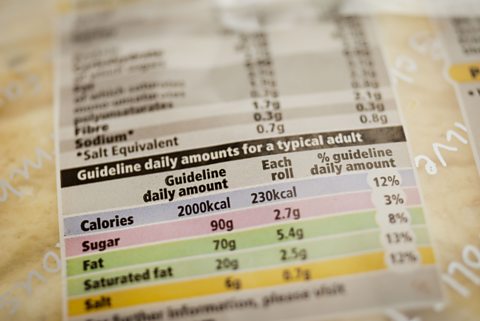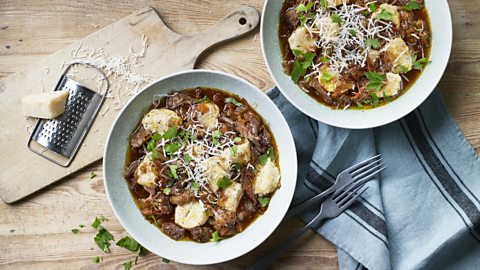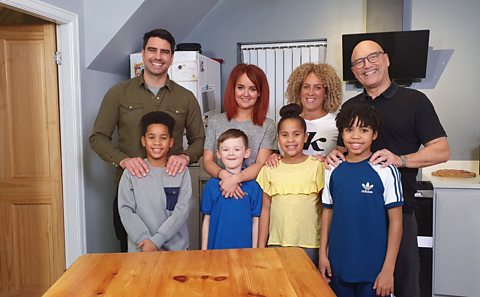Money-saving food shop tips that will make you healthier

It‚Äôs the ≥…»ÀøÏ ÷ One show that celebrates healthy eating on a budget. And in the first few episodes of the new series, Eat Well For Less‚Äô Gregg Wallace and Chris Bavin help families cut their weekly shopping bill and expand their cooking repertoire. Chris explains: ‚ÄúWe are all about lots of small manageable and sustainable changes‚Äù. Here are some of our favourite tips from the series so far, plus extra ones from Chris‚Ķ
Check portion sizes before you buy
When planning your food shop, look at the recommended portion sizes – you might be preparing double what you need, which means taking in more energy and spending more cash. An obvious example is pasta and rice, where you pour out an estimated portion and then find you’ve got loads left over.
In the first episode, we saw Chris and Gregg discuss how many sausages they’d eat in a sitting, and they both said four or five. But, Gregg then pointed out the recommended serving is actually just two.
Consider cheap and easy ‘ready-meal’ swaps

It’s an oldie but a goodie! There are simple dishes you can prepare in the time it takes to prick holes in a ready-meal lid and reheat it in the microwave.
In episode one, we saw a family go from being reliant on ready-meals to cooking dishes for a fraction of the price. They were spending £2 per person on each ready-meal, but a simple and filling omelette came to 50p per portion, saving them £4.50 per meal.
Want to reduce the cost of your weekly shop? Chris suggests: “There are so many money-saving tips on the show, but the main ones are [make] meal plans and write a list and stick to it!”
Check the nutrition profile

We’re not suggesting you sign up for a PHD in nutrition, but consider whether there’s a healthier equivalent out there when you buy a food. We really see the importance of this in Eat Well For Less when they measure foods against ‘junk’ food.
In episode two, processed ready-to-eat lunchbox favourites are analysed. Chris and Gregg discover a lunchbox filled with these products contains the same amount of saturated fat as you’d find in five fast-food burgers and buns! Perhaps this goes some way to explaining why 98 out of 100 packed lunches for primary school children don’t meet the government’s guidelines for nutrition. The good news is, the duo highlight what a healthier and cheaper lunchbox looks like – you’ll have to tune in to the episode to see it for yourself.
Taste test to find cheaper brands
“Take part in your own episode of Eat Well for Less”, says Chris.
Could you really taste the difference between an expensive branded breakfast cereal and a cheaper product? Why not put yourself to the test? A classic Eat Well For Less tip is to carry out your own blind taste tests. People on the show often can’t tell the difference and in some instances prefer the cheaper versions. In the first episode a group of hot chocolate aficionados tested various brands of hot chocolate powder. Their favourite? The cheapest supermarket own-label one.
Of course, there’s an element of trial and error with this. But the key is not to give up – just because you don’t like one substitute doesn’t mean you won’t like another.
Keep spices in stock and slow cook

On the show, we see time-poor families use a slow-cooker to make a hearty oxtail ragu in episode two.
If you’re keen to switch from regular takeaways to making similar dishes at home, Chris advises keeping a few key ingredients: “Garlic, ginger and chillies are a must for me. I always buy a big piece of ginger and keep it in the freezer, and do the same with my chillies. Then you always have that flavourful ingredient to hand without any waste.
“No one wants or needs to spend hours in the kitchen. It’s a myth that cooking from scratch takes a long time! But my advice to anyone really short of time is to batch cook, double up. That way you have dinner next time without the need to cook.”
Tricks to get kids eating more healthily

A LOT of people will relate to the parents in the first two episodes. You know the drill: you spend time preparing a delicious, nutritious meal, only for the kids to turn their noses up at it as soon as they sit at the table. Out of desperation, you end up giving them the dishes you know they will eat. In the first two episodes of Eat Well For Less, the parents often resort to ultra-processed dishes or takeaways just to make sure the kids get some food down them. But Chris and Gregg suggest a change of tack. By getting the kids involved in making the dishes and teaching them how to follow a recipe, they feel more invested in the dish and are excited to eat it and get positive feedback.
We also see them quickly adapt to healthier snacks rather than shop-bought confectionery. Chris tells us: “Lots of great recipes are sweet, but not nearly as sugary as shop-bought confectionery. And if you make it yourself, you know exactly what’s in it!
“Make sure you have healthy snacks ready to graze on, that will hopefully help reduce the hunger and then stop you reaching for the biscuits or chocolate. With my children, I know if I was to chop up some fruit and veg and put nuts out, they would eat them happily. But they will eat a lot less if I don’t prep it!”
Shopping locally really can be cheaper
In episode two of Eat Well For Less, we see Chris visit a butcher who sells locally sourced meat in Bristol. Not only is shopping locally good for the environment, with the carbon footprint being lower, but you might also discover products that are just as tasty as your regular purchases but much cheaper. An example? The butcher highlights which cut of beef offers the best value for money, and then demonstrates offal isn’t limited to liver and kidneys. They cook chicken hearts and offer them to passers-by, none of whom have tried hearts before. They all enjoy them and are shocked to learn just how cheap they are compared to other cuts of meat. Of course, this isn’t for everyone, but if you give it a go you might find you’re impressed too!